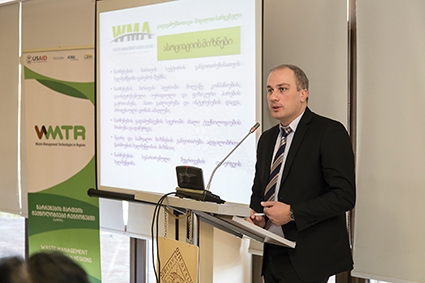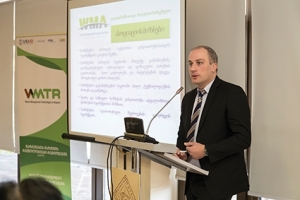Waste Management Association for Environmental and Economic Development
Companies operating in the field of waste recycling, collection and secondary industry have launched the Georgian Waste Management Association (WMA) – the main aim of which is to establish and develop recycling methods, help with waste separation and manufacturing local products out of recycled goods, and create a business-friendly environment. The official presentation of the Association was held in Tbilisi on December 4.
The Georgian Waste Management Association was organized with the support of the USAID-funded Waste Management Technologies in Regions (WMTR) Program on June 5. Representatives of the WMTR claimed that the Association will be a great platform to solving key waste management problems, involving the public in these issues, protecting the environment and more. “Interested parties can meet in the framework of the Association and share their knowledge and create joint projects. The Association will help parties to establish contacts,” said Giorgi Guliashvili, President of the new WMA.
At the presentation the most relevant topics for Georgia were brought up, such as plastic bottle use, export of recyclable material, hazardous chemical waste recycling, legislation and an awareness campaign to involve citizens, especially the young generation.
Nino Shavgulidze, Deputy Chief of the WMTR noted that, to date, the main task is to find and develop technologies for recycling rather than sending them to landfill. “Sending waste to landfill is the last way out of this issue. There are several ways to get rid of garbage and recycling is the most effective, so I’m very pleased that thanks to our cooperation with the government 13 landfills will be closed in Georgia in near future,” Shavgulidze said. “I’m sure that with this new Association we will be able to communicate with other organizations, NGOs and business structures and deal with many more such problems in our country,” she added.
The waste recycle sector is very important for environmental protection, as well as for the country’s economic development. It should rightly push for the involvement of the business sector.
“Waste recycling will help small and medium businesses in Georgia, create jobs, satisfy the requirements of the local market and grow export potential in the European Union as well as in other countries,” said Guliashvili.
The Association will also be a link between the recycling sector and government institutions. Head of the Division of Waste and Chemicals Management of the Ministry of Environment Protection of Georgia Alverd Chankeliani highlighted that there are a lot of problems in this field but the main goal is to start acting. “This Association was created to solve these kinds of problems. Perhaps it is a complex issue, because the business sector is diverse, however, I believe that the presence and understanding of the problem will enable solutions to be sought and hopefully found,” noted Chankeliani.
In the framework of the WMA, it is also scheduled to provide consultation to all interested in the waste management sector, to assist start-up businesses with know-how, to create legislative and social initiatives, to conduct waste management research, and to create and update a database of people involved in the sector.
Eka Karsaulidze












